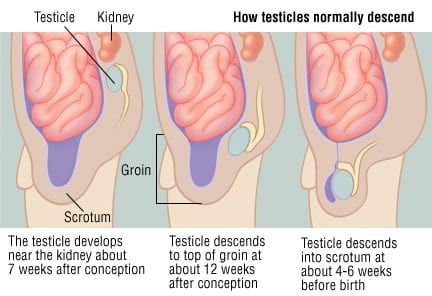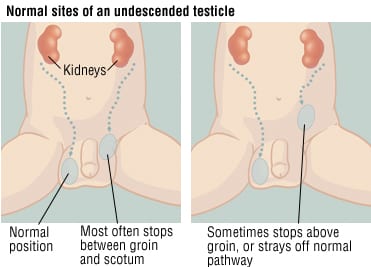Patient Basics: Undescended Testicle (Cryptorchidism)
Originally published by Harvard Health.
What Is It?
An undescended testicle, also called cryptorchidism, is a testicle that has not moved down into the scrotum. Early in pregnancy, the testicles begin developing deep within the abdomen, influenced by several hormones. At 32 to 36 weeks’ gestation, the testicles begin to descend into the scrotum. In 30% of premature and approximately 3% of full-term male infants, one or both of the testicles have not completed their descent at the time of birth. Most of these will then descend spontaneously during the first three to six months of life. By 6 months of age, less than 1% of babies still have the problem. Either one or both testicles can be affected.
An undescended testicle increases the risk of infertility (not being able to have children), testicular cancer, hernias and testicular torsion (twisting). An empty scrotum also can cause significant psychological stress as the boy gets older. For these reasons, early treatment is very important.
Some boys have a normal descended testicle at birth that then appears to move back up into the abdomen when they are between 4 and 10 years old. This condition is called an acquired undescended testicle. This is thought to occur when, for unknown reasons, the spermatic cord attached to the testicle does not grow as quickly as the rest of the child does.
Sometimes, a temporary situation called a retractile testicle is mistaken for an acquired undescended testicle. In this condition, a testicle that has descended fully into the scrotum occasionally retracts into the abdomen. The retraction is caused by an overactive reflex in the cremasteric muscle that pulls the testicle out of the scrotum. Boys who are anxious or ticklish during a testicular exam may have this overactive reflex. A retractile testicle does not increase the risk of infertility or testicular cancer because it always comes back down into the scrotum.
Symptoms
There is usually only one sign that a boy has an undescended testicle. The scrotum appears underdeveloped or smaller on the affected side. In rare cases, the undescended testicle can become twisted (testicular torsion), causing severe groin pain. If this happens, seek medical attention immediately.
Diagnosis
During a physical examination, the doctor will be able to see that one or both testicles is absent from the scrotum. In the majority of cases, the doctor can feel the testicle above the scrotum. If the doctor cannot find and feel the testicle, a specialist needs to determine its position using a procedure called diagnostic laparoscopy. In this procedure, a specially designed video camera is inserted through a small incision to look at an area inside the body directly.
Expected Duration
The majority of undescended testicles descend into the scrotum on their own during the first three to six months of life. If the testicle has not descended by six to nine months of age, it should be evaluated by a specialist.
Prevention
There is no way to prevent this condition because the exact cause is not known.
Treatment
A persistent undescended testicle usually is treated between 6 months and 2 years of age. Most cases can be corrected with a surgical procedure called orchiopexy, in which the surgeon brings the testicle down into the scrotum through the normal abdominal opening and then stitches it into place. Occasionally, more extensive surgery is required.
Hormone injections may be tried prior to surgery. The hormones that are used stimulate the testicles to produce higher amounts of testosterone. This may help the testicle move down into the scrotum.
If the testicle is absent or needs to be removed because it is abnormal, then testicular prostheses (artificial implants) can be considered later in life.
When To Call a Professional
Consult a doctor for a thorough examination if one or both testicles cannot be felt within the scrotum. Seek medical attention immediately for severe groin pain.
Prognosis
The outlook is best if the condition is recognized and corrected before 2 years of age.
Orchiopexy may reduce the risk of infertility because normal sperm production requires the cooler temperature found in the scrotum. After treatment, 50% to 65% of males with 2 undescended testicles are fertile, and 85% with a single undescended testicle are fertile.
Although orchiopexy does not reduce the risk of testicular cancer, it does increase the likelihood of early detection.
Additional Info
American Academy of Family Physicians (AAFP)
11400 Tomahawk Creek Parkway
Leawood, KS 66211-2672
Phone: 913-906-6000
Toll-Free: 1-800-274-2237
http://www.familydoctor.org/
American Academy of Pediatrics (AAP)
141 Northwest Point Blvd.
Elk Grove Village, IL 60007-1098
Phone: 847-434-4000
Fax: 847-434-8000
http://www.aap.org/
American Urological Association
1000 Corporate Blvd.
Linthicum, MD 21090
Phone: 410-689-3700
Toll-Free: 1-866-746-4282
Fax: 410-689-3800
http://www.urologyhealth.org/


